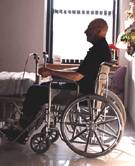- Could Artificial Sweeteners Be Aging the Brain Faster?
- Techniques for Soothing Your Nervous System
- Does the Water in Your House Smell Funny? Here’s Why
- Can a Daily Dose of Apple Cider Vinegar Actually Aid Weight Loss?
- 6 Health Beverages That Can Actually Spike Your Blood Sugar
- Treatment Options for Social Anxiety Disorder
- Understanding the Connection Between Anxiety and Depression
- How Daily Prunes Can Influence Cholesterol and Inflammation
- When to Take B12 for Better Absorption and Energy
- Epsom Salts: Health Benefits and Uses
Could Type 2 Diabetes Shield Against ALS?


Type 2 diabetes may reduce the risk of developing the neurodegenerative disease amyotrophic lateral sclerosis (ALS), a new study suggests.
ALS, also called Lou Gehrig’s disease after the famed baseball player who died of the illness, destroys nerve cells in the brain and spinal cord. Little is known about its causes, and no treatments exist to halt it. About half of ALS patients die within three years of diagnosis, according to the study authors.
This study of Danish residents found that type 2 diabetes — but not obesity, which is often linked to type 2 diabetes — was associated with a possible lower risk of developing ALS.
“We found a protective association between type 2 diabetes and ALS,” said lead author Marianthi-Anna Kioumourtzoglou, a researcher at the Harvard School of Public Health in Boston. “This is a very new finding.”
Only in the past six months have researchers started looking at the potential connection between ALS and diabetes, she said. “The findings have been really consistent across several studies. We don’t know why there is this association,” she said.
Kioumourtzoglou cautioned, however, that these findings only show a link and do not necessarily mean that type 2 diabetes itself reduces the risk of ALS.
Other conditions, such as having high cholesterol or being overweight, have also been found to reduce the risk of developing ALS, she added. “We don’t know if the effect of diabetes is related to those factors or something else,” she said. “We have some theories, but until they are tested they are only theories.”
The findings may provide clues to what causes ALS and someday help in developing treatments, Kioumourtzoglou said.
“With every new study, we are one step closer in understanding ALS,” she said.
The report was published June 1 online in JAMA Neurology.
For the study, Kioumourtzoglou and colleagues collected data on 3,650 people listed in Danish National Registers who were diagnosed with ALS between 1982 and 2009. Their average age was 65. The researchers compared these patients with 365,000 healthy people.
The researchers also identified 9,294 patients diagnosed with type 2 diabetes. Fifty-five of them were later diagnosed with ALS. The average age of the diabetes-related diagnosis was about 60.
Older age at diagnosis for either disease was associated with lower risk for ALS, the researchers said.
About 5,000 Americans are diagnosed with ALS every year, according to the U.S. Centers for Disease Control and Prevention. With the condition, as muscle movement is lost, people may become unable to speak, eat, move and breathe.
Dr. Paul Wright, chairman of neurology at North Shore University Hospital in Manhasset, N.Y., said there are theories about the relationship between ALS and risks for other diseases, such as heart disease and stroke. “People with those risk factors appear to do better in regard to ALS,” he said.
This study adds type 2 diabetes to that list. “It may give us insight to what causes ALS,” he agreed.
Wright reiterated that the new study results don’t prove that type 2 diabetes will prevent someone from developing ALS. Also, “this study should not be misinterpreted as saying it’s good to have diabetes,” he said.
While many people are terrified of ALS, type 2 diabetes is also a serious illness, he stressed. It can lead to heart disease, kidney disease, vision loss, loss of feet and legs, and death.
More information
For more on ALS, visit the ALS Association.
Source: HealthDay
Copyright © 2026 HealthDay. All rights reserved.










